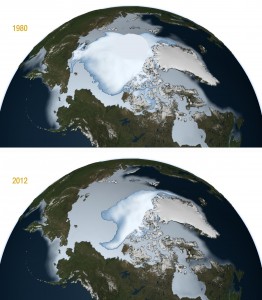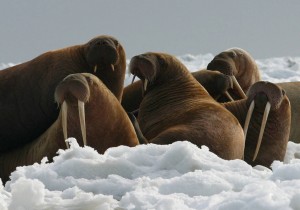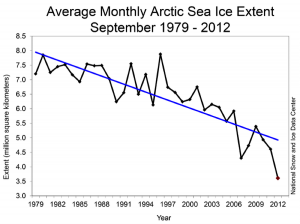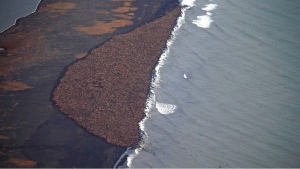Arctic sea ice has been dramatically declining in recent years, as shown by the two images below. Scientists claim that if the current trend (4% decrease per decade) continues, an ice-free Arctic summer may be a reality by as soon as 2020.

NASA images show decrease in Arctic sea ice from 1980 to 2012. Source: Flickr Commons user: NASA Goddard Space Flight Centre
So, why is this so terrifying? Well, the reduced availability of sea ice poses a great threat to the survival of the walrus. Just last week approximately 35,000 walruses (http://www.iflscience.com/environment/walruses-become-refugees-melting-ice) gathered on a beach in Alaska, because they had nowhere else to go.

The walrus, officially known as Odobenus rosmarus, feeds near the ocean floor within the Arctic Circle. They usually feed offshore where there is an abundance of shellfish, molluscs and other soft-bodies organisms. Larger adults feed twice a day, and may consume up to 6,000 clams per feeding, which they do very rapidly.
However, unlike seals, walruses can’t swim for long periods of time, and therefore usually gather on sea ice with other walruses to rest in between feeding periods. With the increased melting of sea ice, walruses are forced to swim to shore instead, having been found on beaches around Alaska and in the Chukchi Sea in previous years.

Walruses resting on sea ice are at increasing danger of losing this natural habitat. Source: Flickr Commons user: USFWS/Joel Garlich-Miller
Now that the walruses are farther away from their natural feeding areas, they have two choices: they can either swim far distances to reach the rich offshore feeding sites (resulting in a net burn of calories), or they can remain close to shore and try to sustain themselves with a much lower quality of food, whilst competing with the thousands of other walruses on land.
Furthermore, the massive crowds of walruses are prone to stampedes, which have led to mass killings via trampling in previous incidences of beach gatherings, particularly of female and juvenile walruses.
The USGS has warned that 17 species, including the walrus, are at risk of extinction as a direct result of decreasing sea ice, particularly because the Artic is warming almost twice as fast as the rest of the world.
It is clear that something needs to change, and change soon, or else our actions as human beings will cause not only the end of Odobenus rosmarus, but also a collapse of the ecosystem in which it is involved.
– Mikaela Stewart


